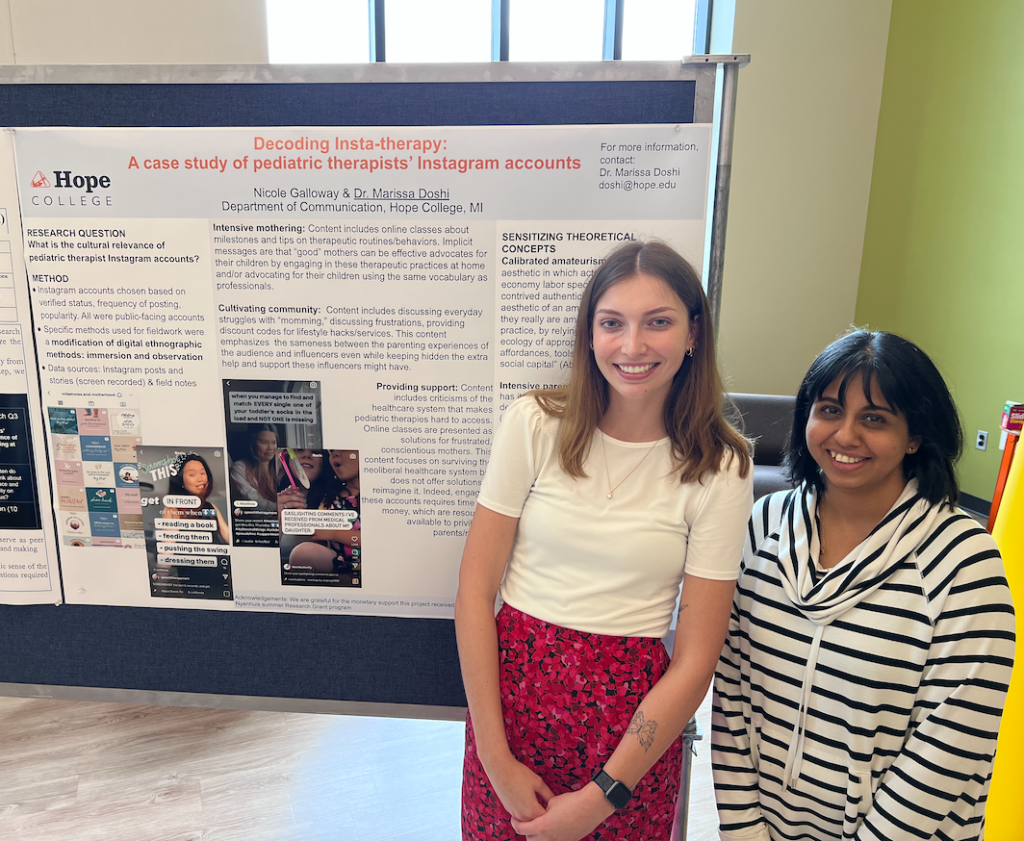Decoding Insta-Therapy with Dr. Marissa Doshi and Nicole Galloway
The Communication Department at Hope College offers a premiere undergraduate learning experience through our Faculty/Student research collaborations. The Communication Department is known for its excellent research and intellectual curiosity. This is a transformational experience.
During Summer 2022, Dr. Marissa Doshi and Comm Major Nicole Galloway won a Nyenhuis Summer Research Grant. This funded their research studying how pediatric therapists present themselves and their work on Instagram.

Q&A with Nicole Galloway
Q1: Can you briefly describe your research?
My research this past summer with Dr. Doshi was on five pediatric therapists’ Instagram accounts. The research question we developed was “What is the cultural relevance of pediatric therapists’ Instagram accounts?” We took a qualitative approach to this research by doing a modified digital ethnography, in which we immersed ourselves in data and observed what was happening. The data we engaged with were the Instagram posts, stories, and field notes from these five accounts. Sensitizing theoretical concepts that helped define our research were intensive parenting and calibrated amateurism.
Note: Intensive parenting refers to an “intense” type of parenting–usually mothering–in which the parent is always trying to “do enough” or “spend enough” time with a child. It’s a type of parenting that holds parents responsible for having “picture perfect” kids.
Calibrated Amateurism, meanwhile, refers to the ways in which experts and professionals try to appear more relatable (like an amateur instead of an authority figure) to their audience. This is calibrated, meaning it is done on purpose. For example, a pediatric therapist might tell a funny story about misunderstanding her child to make her parenting and her take-away point more relatable to other parents.
Q2: What was your biggest take-away or finding from this research?
Our takeaway/findings from this research were three ways in which these pediatric therapist accounts engage with their viewers. In analyzing our data, we found that messages of intensive mothering are reified, authority and community are fostered through “calibrated amateurism,” and these accounts act as a support system to support a neoliberal healthcare system.
Q3: What did you learn by working with Dr. Doshi on this project?
Working with Dr. Doshi on this research exposed me to a type of research I wasn’t necessarily comfortable with at first. Throughout our work, I kept trying to search for one, “final” answer as we analyzed our data. I quickly realized this wasn’t the type of research in which you have a hypothesis that you’re trying to prove/disprove, rather you have to analyze the data as it emerges. In this kind of research, there isn’t always one single answer that gives a single explanation. There are a lot of complex nuances that have to be taken into account.
Q4: What does this experience mean to you?
To be able to have this experience, I believe, is truly due to the unique nature of the Hope College Communication Department. I’m not sure I would have had this opportunity as an undergraduate student studying social science at another school. The Communication Department is always pushing Comm undergrads to explore further and dive deeper. I am grateful to Dr. Doshi, the Nyenhuis Summer Research Grant, my Comm professors, and Hope College Communication Department for such a one-of-a-kind experience!

